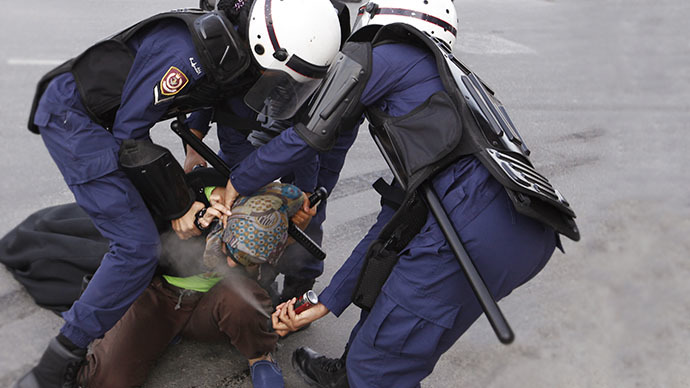The report was issued by five human rights organizations on the International Day in Support of Victims of Torture on June 26, 2017.
The report condemned the involvement of the judiciary in covering up and justifying the torture of victims who testified themselves inside courtrooms. They also expressed their deep regret at the failure to hold accountable, stop and expose such illegal and internationally prohibited practices taking place at the Criminal Investigation Department, Jaw Central Prison, the National Security Agency's (NSA) security facility in Muharraq City or other detention centers.
Among the important cases documents in the report is the death of martyr Hassan Al-Haiki who died in prison due to torture. The report also tackled the death sentences that have been recently issued against torture victims, including Sayed Ahmed Al-Abbar and Hussein Ali Muhammad, as well as the execution sentences carried out for the first time against 3 citizens; Sami Mushaima, Ali Al-Singace and Abbas Al-Samie. The report pointed out to cases of enforced disappearance, including cases of Sayed Alawi Sayed Hussein and Sayed Fadhel Abbas Radhi.
The report contained a part documenting torture stories in the NSA building that started since May after Diraz attack. Local human rights organizations have documented numerous cases of torture committed by members of the NSA. In May 2017, a number of human rights defenders entered for interrogation by the NSA, at the security compound, on the third floor, in room number 1, during which extended hours of interrogations took place. They were beaten, forced to sand and blindfolded throughout the entire course of investigations. No lawyer was allowed to follow the proceedings if the investigation.
They were also subjected to religious disrespect, insult, defamation, vilification, verbal harassment, sexual assault, electric shock and stripping them naked. The investigation attempted to intimidate them by threatening to target their family members and colleagues if they do not suspend their activities with local and international human rights organizations. Some have been forced to announce on Twitter their suspension of any human rights work and social media activities
Human rights organization participating in issuing this report; Salam for Democracy and Human Rights, Bahrain Center for Human Rights, The European-Bahraini Organization for Human Rights, Bahrain Forum for Human Rights and Persian Gulf Institute for Democracy and Human Rights concluded their report by calling on the Bahraini authorities to immediately stop the use of torture as a policy to extract confessions and to spread fear and intimidation among people.
They also called on the Bahraini regime to immediately, impartially and transparently investigate the allegations of torture against dozens of offices in the NSA who are involved in torture and other human rights violations, hold accountable the perpetrators, compensate the victims, put an end to impunity governing the police forces and allow the UN Special Rapporteur on Torture to visit Bahrain urgently and allow him to work freely and meet the victims unconditionally.
Anti-regime protesters have held demonstrations in Bahrain on an almost daily basis ever since a popular uprising began in the country on February 14, 2011. People have been demanding that the Al Khalifah dynasty relinquish power and a just system representing all Bahrainis be established. Many people have lost their lives and hundreds of others sustained injuries or been arrested, illegally detained and brutally tortured while many have seen their citizenship revoked. In March 2011, troops from Saudi Arabia and the United Arab Emirates — themselves repressive Arab regimes — were deployed to aid Bahrain in its brutal crackdown.
/106

